They fly through the air with the greatest of ease.
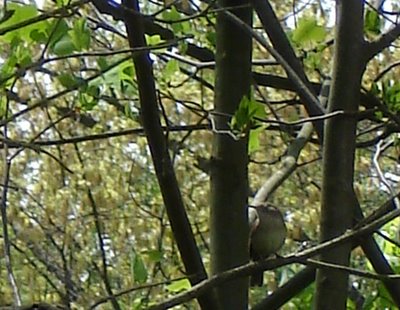
Today was a day for watching things fly. I spent the night and the better part of the day on my couch; by the time it was sunny again outside, I was awake and upright again, alternately reading my excellent book and looking out my back windows at the variety of animals darting about, building nests and finding food and making small noises.
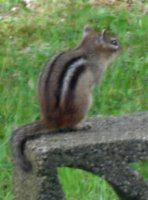 First, there was the chipmunk on my patio. Do you know that chipmunks chirp like small birds? I learned this fact last summer when I was taking care of my landlord's family's parakeet. The parakeet would sing along with or reply to other birds' calls and songs. But she always ignored the most persistent chirp of all. One day, I looked out the side window and realized that the sound was coming from a chipmunk perched on the patio step. Today, the chirping offender sat atop the decorative blocks that edge my patio, and my rattling the window could not deter his birdlike sound, which he made for hours straight--and though I am an exaggerater to the core, I am not exaggerating this detail.
First, there was the chipmunk on my patio. Do you know that chipmunks chirp like small birds? I learned this fact last summer when I was taking care of my landlord's family's parakeet. The parakeet would sing along with or reply to other birds' calls and songs. But she always ignored the most persistent chirp of all. One day, I looked out the side window and realized that the sound was coming from a chipmunk perched on the patio step. Today, the chirping offender sat atop the decorative blocks that edge my patio, and my rattling the window could not deter his birdlike sound, which he made for hours straight--and though I am an exaggerater to the core, I am not exaggerating this detail.The next animals of real note were among my favorites for the day: the house wrens who are building a nest in my yard's birdhouse, which has stood empty the whole time I've lived here. Now, it seems possible to me that this picture of said birdhouse reveals that there are two species of birds competing for this prime piece of Gambier real estate, because the bird in this picture doesn't seem to have the right beak for a wren. It looks more like a finch or even a house sparrow to me. But the bird at the top of this post, the bird in the tree, looks to me like a wren. And these birds certainly sounded like wrens to me. I thus cannot account for a finchy looking bird on the house; I can only think back to the time in March when I doubted a cardinal was a cardinal, simply because I was looking at him from an unusual angle.
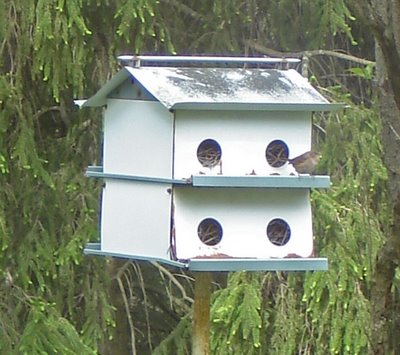
Watching the birds, I found that the super-zoom feature on my camera came in handy, though it also left the pictures looking less crisp than I'd have liked. (Having shot the birds through a house window might also have had a negative impact on my photo quality.)
I have now erased the fatigue that forced this writing's early termination last night (it is Monday, but I will continue writing a Sunday writing, and today will simply be a double writing day--because it can be! because, sorrow and relief and loss intermingled, I will not spend three hours tonight guiding fourteen young people through what some of them affectionately call big fat novels).
What I faced yesterday morning, regarding these flying and cheeping and singing things, was a quandary: I could not get a good look at them from within the house, but even the quietest slipping out through the back door would have been enough to startle them out of countenance. Binoculars, of course, would have been the logical solution to this problem of indomitable distance. But, entirely appropriately, to my mind, I have always had trouble with optics. I can only rarely force my severely myopic and astigmatic eyes to focus correctly through binoculars. I have tended simply to close one eye and look at whatever two-dimensional image I get. I have felt this difficulty as a sorrow all my adult life.
I felt it even in my adolescence, when my biology class turned to dissection and microscopic investigation of tissue, and I could not focus the microscope and see what I knew would astound me. I had a microscope when I was eight, a white and black plastic instrument with both a reflecting mirror to illuminate specimens with natural light and also a small electric bulb that could do the job more reliably (though it also introduced an element of heat that could not have been scientifically sound). I loved the microscope more than my chemistry set, more than almost anything, for that first winter I had it. It came with a yellow box of pre-prepared slides. Many of them didn't resolve into anything interesting when I looked at them, but one in particular I looked at over and over. Had Nabokov not gotten to the realm of forgetfulness first and sanctified it for all future would-be autobiographical artists, I would feel worse than I do about not being able to remember whether that favorite slide was a drop of blood or a shard of wing. It's possible that there were two and that I loved them with equal passion. My mother helped me peel the diaphanous inner skin of an onion and mount it on one of the blank slides--this set even came with tiny bottles of dye for the purposes of preparing different kinds of specimens--and I loved its miniscule rainbows, made huge under my lenses.
That was before I got glasses, now that I think about it--and suddenly a writing about flight becomes a writing about near-sightedness. I somehow limped my way through nearly all of fourth grade unable to see the chalkboard from the back of the room. In April, my teacher finally caught me working a math problem in my head instead of reading an answer from the board--this, after I had already missed all of the Spanish some visiting high school students had come to teach us once a week, and after I had missed who knows what else because I didn't realize what was happening to my vision. Now, my vision is as sharp as it could be, when corrected, and as near to blind as I care to go, when not. I heard someone say recently, "My eye doctor told me that if I hadn't gone to grad school, I'd still have 20/20 vision." (I suppose I must have been in Ottawa.) By the time I reached grad school, my eyes had already degenerated to nearly as bad as they are now--but perhaps that fact speaks more to my having always wanted to be a grad student, even before I knew what graduate school was.
My microscope sat on the yellow wooden table of my childhood, under the back window of my yellow-flowered bedroom, and during the winter of my eighth year, I spent hours poring over whatever was under my lens. Two years later, I would egg my young brother on to become my research partner in studying the Titanic, about which we would write a research paper for who knows what venue--the immense court of world historical knowledge gleaming vaguely in the galloping-growing back of my mind, I suspect, an immense court that had much to do with the burgundy leather and gilt set of World Book encyclopedias in which I studied everything from Indiana to the French Revolution to sex. (That was how I learned: sitting on the rust-colored sofa, on an evening when my family's friend came over to fry up fish for our dinner, cross-referencing on a hunch and cross-referencing some more until, oh, there, and really? that?) My research desires also had a lot to do with my Scholastic Books biography of Marie Curie, who once read a book at her family's dining room table with perfect, unshakeable concentration while her siblings stacked all the other dining room chairs in a tower behind her, just to see if they could rattle her. (She didn't look up until they toppled the chairs.) I wanted to be that focused, that concentrated; it is a longstanding ideal, you see.
And so I suppose that I was swallowed by some resurgence of an old, youthful desire, sitting on my couch watching these tiny birds flitting to and from the birdhouse, looking them up in Sibley and Audubon, listening to birdsong via Cornell's All About Birds site (which talks about wrens' "skulking habit," something that makes me love wrens even more), taking pictures with the super-zoom and then zooming in on my images to see what extra details I could find that way. But not being able to figure out with certainty what I was watching--what bird it was, bearing stick after stick to the birdhouse (unused these two years), then having to figure out how to get these too-long sticks into the top-right apartment that they've settled on, then flying off to find more sticks--was a major frustration.
And then:
Then, a yellow butterfly drifted into my field of vision, alighting first on the purple lilacs, then on the white, making the loveliest and strangest of contrasts, flitting and then flattening onto the yard's flowering cones. And then I had two creatures to identify. The butterfly dangled tantalizingly, delicately, beneath a lilac for a little while; I thought about having missed the lilac festival completely while I lived in Rochester, where the annual lilac festival is a major, traffic-stopping event. I would drive near the lilac-filled parks at dusk, slowly, with the windows down, breathing and breathing and thinking about Ohio, thinking about leaving the city, flitting near the flowers but never really landing to imbibe them properly.
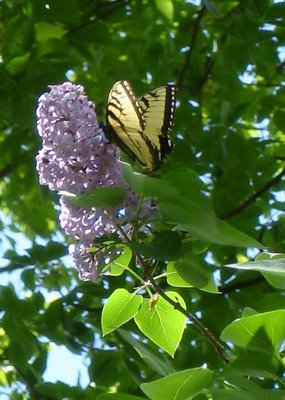
The yellow butterfly, it seems, is a Tiger Swallowtail, something I ascertained through yet more long-distance photography (grateful, for the first time, that I chose the camera with the longest digital zoom range available last year). But for this one, I eventually ventured outside and crept near--only to anger the wrens who were hanging about in the trees near the lilac and who raised a loud complaint to their companions across the yard and would not accept my apologies for having trespassed on their space.
Back in the house, I watched for the rest of the afternoon (as I continued reading my excellent book) while the air lived its way through the day: the maple tree seeking to propagate its kind; the swallows cutting the upper blue with their wings so like knives, daggers, small scythes; the wrens bearing stick after stick; the small insects, visibly relieved that winter is over and the sun is so high for so long, darting and dipping and alighting and alighting and alighting.

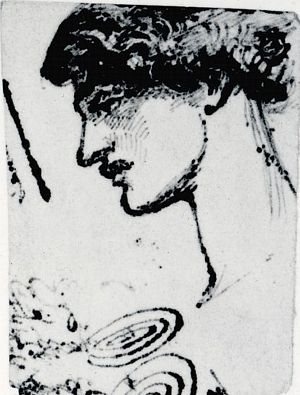

1 Comments:
Just today I discovered that a mother duck and nine ducklings living just behind my apartment. She is a crafty and careful one, this duck; upon seeing me move toward the window, she turned and fixed me with a glare, daring me to take one step closer to her precious brood.
Later, in the parking lot, I was able to see duck and ducklings off in the distance, as well as a cat napping in the sun. The eleven of them had reached an entente, apparently, as the ducks seemed entirely unconcerned by the cat's presence.
Post a Comment
<< Home